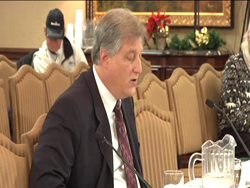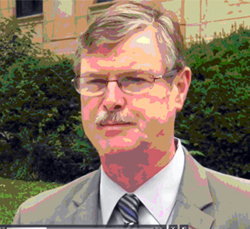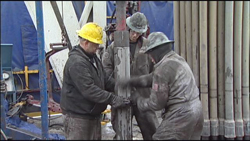All Quiet on the Treatment Front for Fracking Wastewater
By Frank Parlato
 |
| Paul Drof. |
 |
| Paul Dyster |
 |
| Fracking Probe |
Frackers, and their supportive politicians, have been looking at Niagara Falls as a partial solution to the industry's biggest problem: treating and disposing of fracking wastewater.
And whether or not fracking is permitted in New York State, the billions of gallons of fracking waste from other states, including Pennsylvania and Ohio, could be treated right here.
Fracking wastewater treatment is estimated to be a $100-billion industry as 17 shale fracking states, producing 280 billion gallons of fracking wastewater in 2012, need to dispose of it.
The issue of fracking may be the sleeper issue in Niagara Falls in 2014.
And Niagara Falls is ready to wake up to it.
According to Niagara Fall Water Board Executive Director Paul Drof, the Niagara Falls treatment plant on Buffalo Ave. could treat fracking wastewater above standards set by the EPA and most likely meet any DEC standards that will be law when and if the Water Board accepts fracking wastewater.
But a city ordinance banning the treatment of frack wastewater, passed in 2012, stands in the way of frackers and a city known for its desire to profit from industrial and municipal waste.
Niagara Falls Mayor Paul A. Dyster has spoken against New York State approving fracking.
But he has not voiced objection to accepting fracking wastewater for treatment in his city. In fact, Dyster said he defers the decision to the water board.
On Sept. 16, 2011, when it was reported that the Niagara Falls Water Board was moving toward long range plans to treat 'fracking fluid,' following a feasibility study performed by an outside firm, WGRZ TV contacted Dyster.
Dyster "declined to speak on the topic... deferring to the Water Board."
"We're neither for nor against fracking (drilling)," Water Board Escutive Director Drof told the media "but if it happens [the Water Board] would need to know... what would need to be done - and be able to safely handle the waste."
In deferring to the Water Board on fracking wastewater, Dyster could have pointed out that the Independent Oil and Gas Association of New York, named Drof an "expert" and he spoke on “Treatment of Hydrofracking Fluids/Residuals at Municipal Wastewater Treatment Plants” at the oil and gas association's 2011 Summer Meeting in Findley Lake.
Drof has assured the public that the Water Board would be subject to regulations and monitoring from the DEC and the EPA, and that while "no wastewater treatment plant puts out drinking-quality water," the effluence of fracking wastewater that would flow out of the treatment plant into the Niagara River, would be "treated to a point where it is considered to not be environmentally harmful."
The Buffalo Ave. treatment plant, built in the late 1970's, once generated millions of dollars in annual income from treating wastewater from numerous chemical plants. Over the years, as plants closed, industrial revenues fell 48 percent. Meantime, costs for running the Water Board have gone up.
“This is a great opportunity to use an underused public utility to provide rate stabilization and rate reduction,” Drof has said.
As for Dyster, he has rarely spoken on the subject. But when the Niagara USA Chamber of Commerce asked him directly, "Would you support the treatment of hydro-fracturing waste water at the Niagara Falls Water treatment plant,” Dyster said, in a published interview, that the city of Niagara Falls, which he oversees, as opposed to the Water Board, was not going to treat fracking wastewater and that he had no control over the Water Board, which might very well accept fracking waste water.
"No," Dyster said. "The city of Niagara Falls is not contemplating the importation and/or treatment of hydro-fracking wastewater. The issue has been raised at the Niagara Falls Water Board, which is a separate entity. While the Water Board is conducting research to determine the capability of the plant to treat hydro-fracking waste, it has made no decision to accept hydro-fracking waste. Moreover, the New York State Department of Environmental Conservation is currently accepting comments on a draft of its own Environmental Impact Statement that will help determine whether hydro-fracking is allowed in New York State at all. I intend to put together in coming weeks a Mayor’s Advisory Task Force to help the city develop appropriate legislative, legal or policy responses so that we are prepared to protect the public’s health, and the water quality of the Niagara River, whatever the future turn of events."
While Dyster said it is up to the Water Board, and that he would form an advisory board to advise him on "health" and "water quality of the Niagara River," he did not condemn the idea of treating frack wastewater in Niagara Falls.
"Whatever the future turn of events," Dyster said, whether to treat fracking wastewater or not, he would not oppose it, but he would be vigilant of dangers to the drinking water and the health of the Niagara River.
But, the council majority at that time was not so agreeable.
In early 2012, in response to the Water Board's clear direction pursuing the treatment of frack wastewater, the council majority, led by then Chairman Sam Fruscione, passed an ordinance banning fracking-related activity, including the treatment of fracking wastewater in the city.
The city does not run the treatment plant, but Fruscione said the ban will prevent the Water Board from treating fracking waste.
“They’d have to bring it in by helicopter,” Fruscione said.
After the City Council passed the ban, the Water Board threatened to sue the city. Longtime Dyster ally, Water Board Member Mike McNally, said the City Council "overstepped their boundaries."
He and board member Nicholas Marchelos voted to sue the city.
Their measure failed when they were outvoted by board members Renae Kimble, Thomas Vitello and a reluctant Ted Janese who voted against the lawsuit, as he told the media, because the Water Board was still waiting for state approval to allow the treatment of wastewater.
Since there was no immediate approval, there was no point in spending money to litigate, he said at the time.
Dyster agreed.
“Everybody knows New York is trying to figure out what to do about hydro-fracking,” he said in 2012. “And everybody knows that Niagara Falls, just from a technical standpoint, would be the candidate treatment facility for fracking water, if you decided to go that direction.”
While Niagara Falls and much of the rest of the state wait for a decision on fracking in New York, Pennsylvania and Ohio frackers desperately need somewhere to dump billions of gallons of fracking wastewater and they will pay dearly to use the Niagara Falls facility.
The city ordinance stands in the way of frack wastewater treatment.
There was little chance that the old council majority would have considered overturning the ban. Fruscione is gone.
Dyster will have new majority on the city council in 2014.
Will he seek to set aside the city's anti-fracking ordinance?